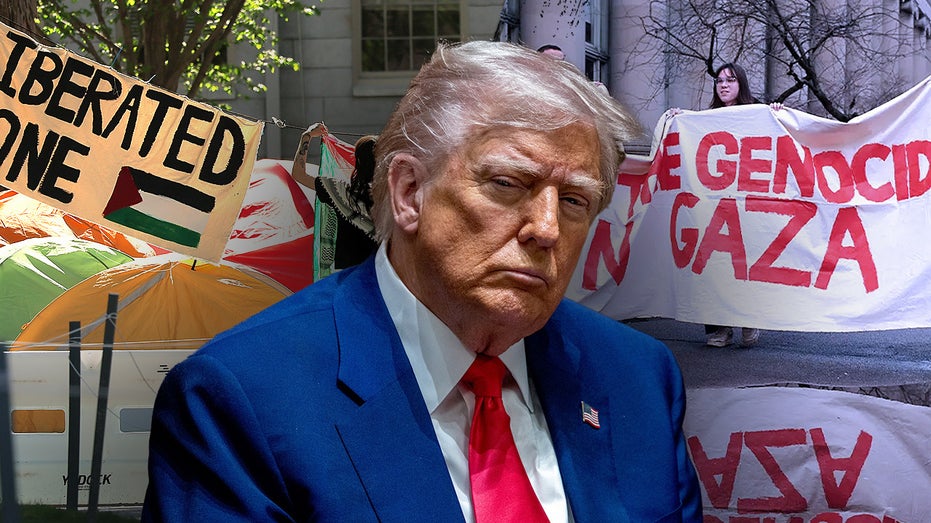Trump Admin Strengthens Anti-Hate Measures as DOJ Official Exposes Radical Protesters' 'Violent Rhetoric'
Antisemitic incidents spike amid Trump's law-and-order clampdown on pro-Palestinian activism at universities and abroad.

The Trump administration has adopted a markedly tougher stance in response to the escalating wave of antisemitic incidents across the United States, implementing sweeping investigations, penalizing prominent academic institutions, and taking steps to tighten immigration enforcement. According to officials, these measures are designed to address both the rhetoric and violence directed at Jewish communities, particularly in the volatile period following Hamas’s October 2023 attack on Israel.
President Donald Trump, through the Department of Justice and allied agencies, has prioritized a law-and-order approach that top deputies say is essential amid a surge in hate crimes. However, civil rights advocates warn that these responses may veer into overreach, potentially undermining core democratic freedoms.
Harmeet Dhillon, the Justice Department's assistant attorney general for the Civil Rights Division, emphasized that the majority of cases do not hinge on nuanced questions of free speech versus antisemitic behavior. “Criticizing the government of Israel is not what I’m typically seeing here,” Dhillon stated. “It’s literally people saying Israel shouldn’t exist — and bringing the revolution to the United States.” She added that such violent rhetoric is leading directly to real-world violence against Jews on American soil.
FBI hate crime data reinforces concerns about this trend, documenting a dramatic spike in anti-Jewish incidents after the events of October 2023, with the pattern showing no signs of abating into 2024. The Anti-Defamation League’s ongoing tracking corroborates these findings, highlighting high-profile attacks and a sustained threat environment.
Recent cases have poured fuel on the already fraught national discourse. In Boulder, Colorado, a man identified as Mohamed Sabry Soliman allegedly injured 15 people — including elderly participants and a dog — during a pro-Israel demonstration, reportedly using Molotov cocktails. The suspect is alleged to have declared intentions to “kill all Zionist people,” according to federal affidavits. Meanwhile, the shooting of two Israeli Embassy staff members outside the Capitol Jewish Museum in Washington, D.C. — with the assailant reportedly invoking “Free Palestine” — is being prosecuted as a hate crime and act of terrorism.
The administration has also targeted antisemitic violence linked to property destruction. Notably, Pennsylvania Governor Josh Shapiro’s residence was set on fire on the first night of Passover; the suspect referenced Palestine and accused the Jewish governor of complicity in violence against Palestinians.
In parallel, the Trump administration has escalated its scrutiny of elite universities, accusing them of fostering environments hostile to Jewish students. Harvard and Columbia University are embroiled in litigation after the administration moved to freeze federal funding and restrict foreign student enrollment. While the universities have secured temporary stays, they face an uncertain legal future as the administration signals willingness to pursue the matter all the way to the Supreme Court.
University campuses have become flashpoints, with the administration citing disruptive pro-Palestinian protests, building occupations, and encampments as justification for federal intervention. There is growing concern among civil rights groups that these unprecedented federal actions infringe on constitutionally protected freedoms — especially when non-citizen students are targeted for deportation over their protest activities.
The administration’s zero-tolerance posture was underscored by cases like that of Mahmoud Khalil, who was detained for allegedly violating immigration laws by engaging in anti-Israel activism. Khalil disputes the allegations, stating in court that his actions amounted to peaceful protest over Israeli policy, not support for violence.
More than 60 civil rights organizations issued a joint statement this week urging the administration not to conflate legitimate protest with hate crimes or use the threat environment to justify “inhumane immigration policies” or witch hunts targeting Arab Americans and Palestinian rights activists. They cautioned that overly broad crackdowns could ultimately make everyone “less safe."
Despite these concerns, officials like Dhillon maintain their core mission is the strict enforcement of federal civil rights laws, not the ambiguous balancing of campus free speech. She indicated that her office has expanded investigations under statutes protecting religious land use — including several involving Jewish synagogues — while also facilitating grants for increased security at places of worship.
Significant personnel changes within the DOJ’s Civil Rights Division have not deterred the administration from pressing forward. Dhillon dismissed reports of mass resignations, asserting her focus remains squarely on confronting antisemitism.
The DOJ has also drawn attention for launching internal probes into university protest movements, including a contentious investigation of Columbia University demonstrators. While some attorneys have expressed unease about the rigor of these probes, senior officials have doubled down, insisting that the presence of Hamas-linked symbolism on campus merits robust inquiry.
Jewish student leaders, for their part, have welcomed the administration’s crackdown, viewing it as a long-overdue acknowledgment of the danger facing their communities. Senior officials stress that there is direct and frequent communication between the government and Jewish leadership, with new grants and support channels established to bolster safety and security in the wake of recent events.




